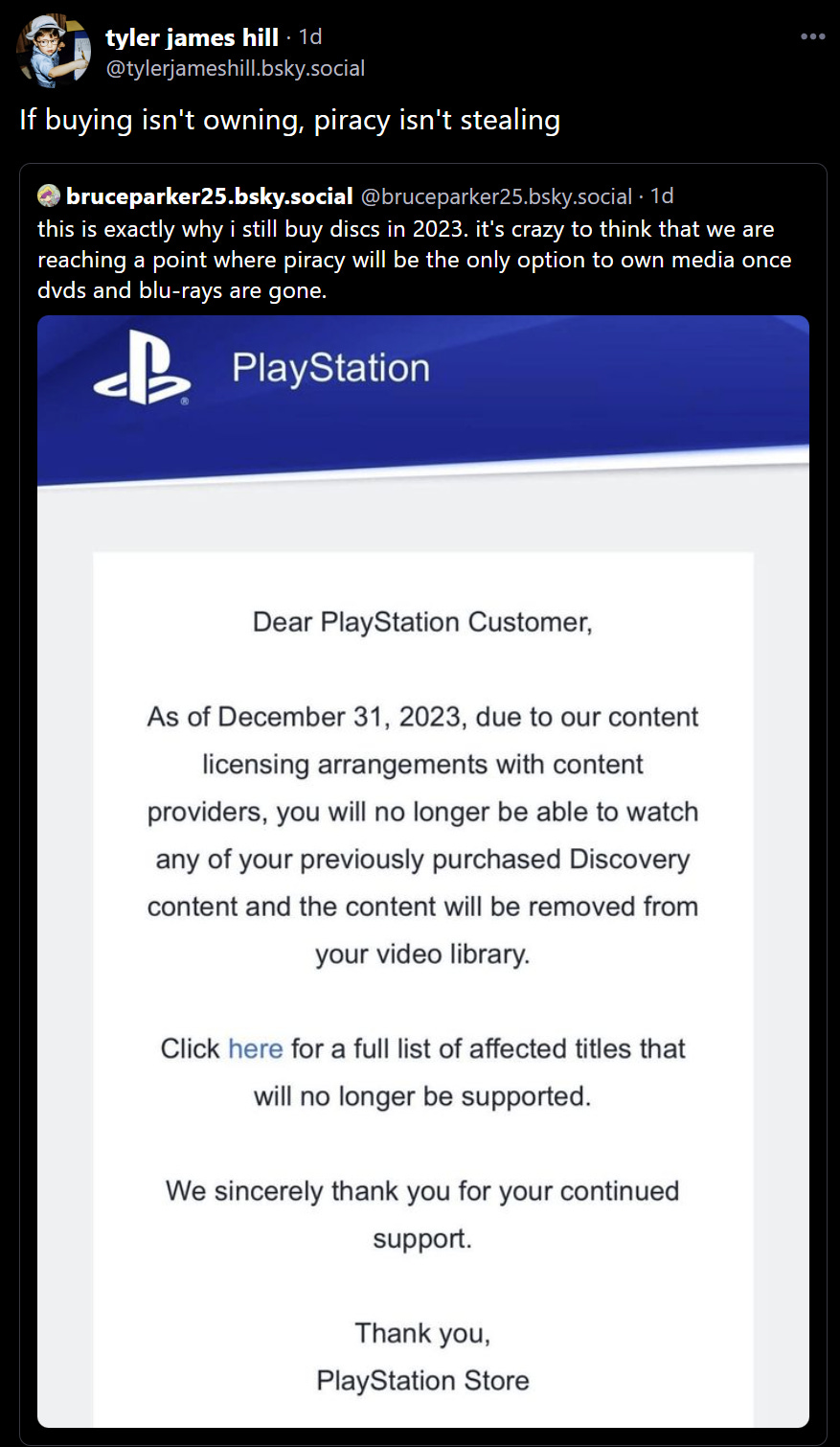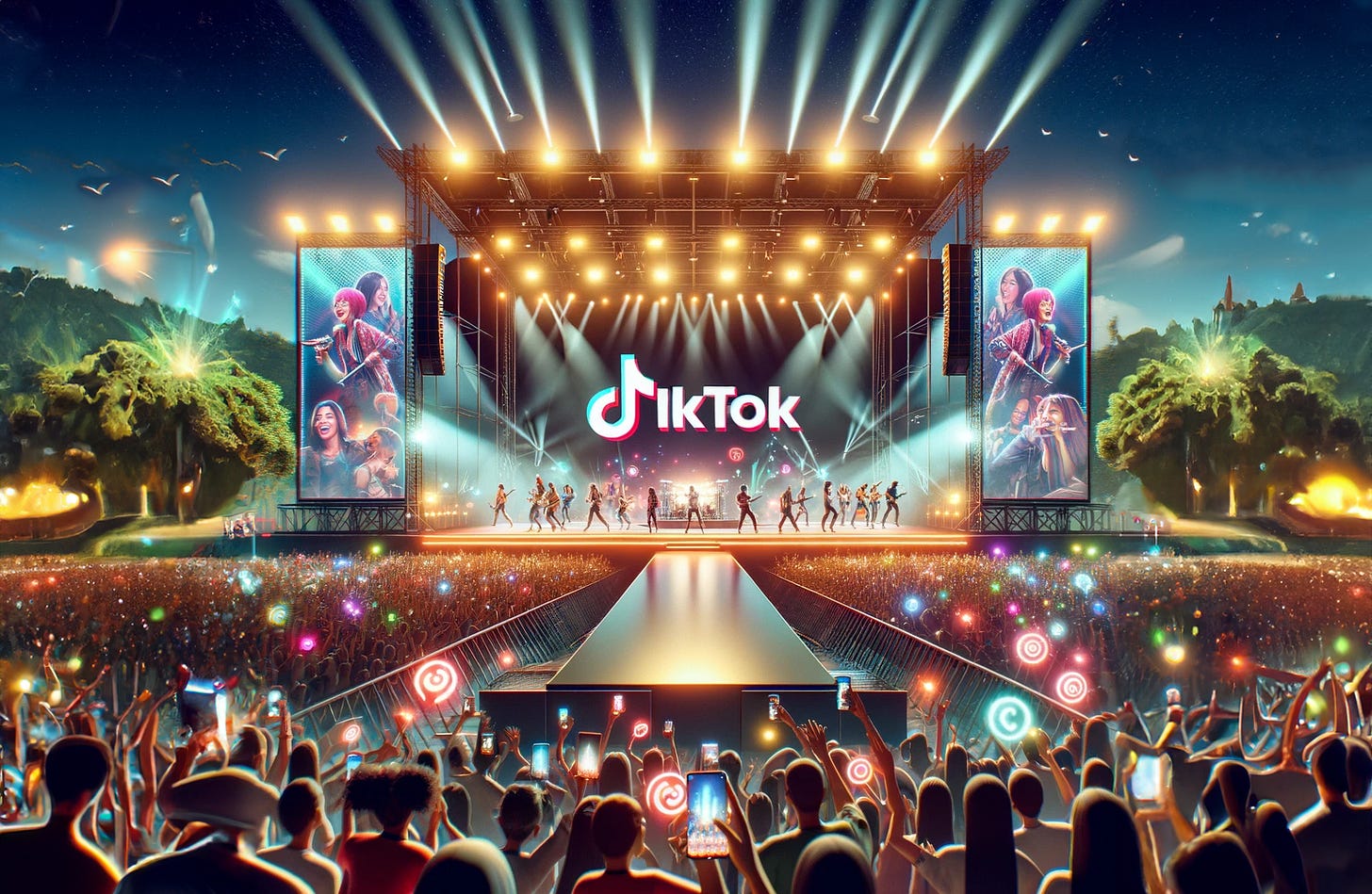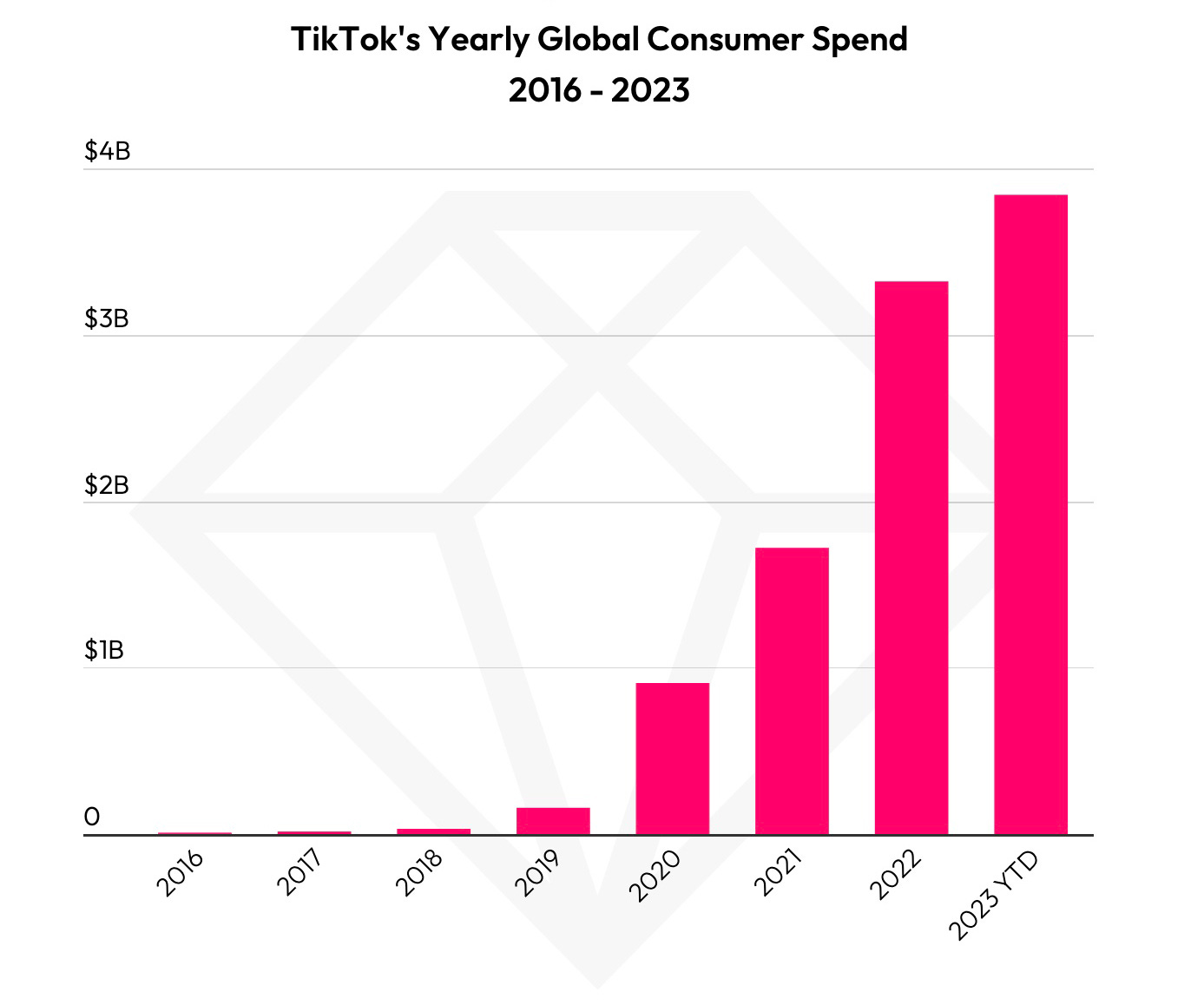134: Spotify is burning, Piracy is back, TikTok crushes all, Nowstolgia, and more!
Tech Tides Turning: A Deep Dive into Spotify's Struggles, The Resurgence of Piracy, TikTok's Dominance, and the Whirlwind of Nowstalgia.
What a Waste
All year long, there's been a deafening narrative about the wonders of AI and its supposed seismic shifts in our economy. But for Spotify, it's a different story.
After recklessly pouring millions into less-than-stellar celebrity podcasts and overindulging in boutique podcast firms, Spotify seems to have landed back on Earth. Now, they're resorting to plain old content publishing deals, a far cry from their previous 'we're the future' bravado. As for AI, it's hardly the job-stealer it's made out to be at Spotify.
Their “AI-powered” features like the DJ and enhanced recommendations are merely rebranded versions of old tricks. It seems 'AI' is just the latest buzzword to keep the investors smiling in what's becoming an increasingly bland and transparent playbook of an unremarkable company.
I still root for Spotify, and I’m grateful for my time spent there, but Apple Music’s recent advancements in discovery have delivered much of what Spotify was unable to achieve in hyper-personalized playlists.
Welcome Back, Pirates.
When the paid version is worse than the free one.
The art of manipulation has reached new heights, with companies like HP using "security updates" to sabotage third-party ink usage in printers. This ploy, a mix of greed and control, hinges on Digital Rights Management (DRM) laws, making it illegal (a felony!) to reverse-engineer DRM-protected products. Essentially, your right to repair or modify what you own is now a legal battlefield.
The epitome of this issue is showcased in McDonald's McFlurry machines. Designed to malfunction, they're a cash cow for the manufacturer, who charges exorbitant repair fees. This lucrative racket faces threats from third-party fixes, which are swiftly crushed under legal threats. Similarly, in Poland, the NEWAG Impuls locomotives are rigged to self-destruct if serviced independently, underlining a growing global trend against consumer rights.
The problem is more sinister than just corporate greed.
When companies create products capable of remote, irreversible downgrades, they open a Pandora's box. This design invites misuse both internally and externally, leading to situations where you lose control over your own purchases. Take Adobe's Photoshop debacle, for example. A lost deal with Pantone meant that users suddenly had to pay extra to access their own artwork, turning completed projects into hostage situations.
The trend is not slowing down. PlayStation users were informed this month that Warner TV shows THEY PURCHASED would vanish, thanks to corporate decisions, without refunds. It's a blatant theft of digital property, facilitated by the design choices of Sony.
“If buying isn’t owning, piracy isn’t stealing.”
I salute you, Tyler James Hill!
Ownership in the digital age is a myth, and piracy has become the Robin Hood of modern media.
Piracy was once black-and-white: copy a DVD, swipe a game, or snag an album without opening your wallet, and you're a criminal. It was straightforward theft because you could actually buy and own these items. But in today's landscape, true ownership is a joke. We're often just renting bytes that can vanish into thin air, thanks to the whims of corporate puppet masters.
We swapped CDs and DVDs for the promise of endless streaming libraries, trading tangible ownership for the allure of convenience. Yet, as "content" evaporates from our screens, we're left grasping at digital ghosts. No wonder that "piracy" is evolving. When the gatekeepers fail to preserve the art and culture they charge us for, unauthorized downloading and sharing become acts of digital preservation, not theft. It's not piracy; it's a lifeline for media in danger of being wiped from collective memory by greed.
Nearly 10 million people tuned in to watch TikTok’s first-ever live concert
TikTok’s very first concert was also its biggest live-streamed event to date. The platform hit Arizona’s Sloan Park on December 10 for In the Mix, a live production that included three sponsored rebroadcasts and a one-hour special.
On stage: Cardi B, Peso Pluma, Charlie Puth, Niall Horan, and Anitta. Emerging artists included Isabel LaRosa, Kaliii, Lu Kala, and Sam Barbere.
The audience: 33.5 million viewers watched TikTok’s big show.
9.6 million viewers tuned in live from various devices. (17,000 people were at the show in-person.)
Almost 24 million people watched three rebroadcasts sponsored by Paramount and Coca-Cola.
Tikok also released a Disney+ and Hulu-exclusive special featuring In the Mix footage on Friday—meaning views are still accumulating.
Why it matters: TikTok is establishing itself as a music industry tastemaker and elbowing its way into the streaming world at the same time.
In the Mix’s total viewership stats are very similar to those generated by one of YouTube’s biggest live-streamed events of all time: Dear Class of 2020.
That stream topped out at 665,000 concurrent viewers, but its VOD hit 34 million views after 72 hours.
AI’s impact on hiring in 2024
A recent survey of 750 business leaders in the US shows that employers are very keen on new hires that have AI skills, and believe that these skills will result in higher job security. Some takeaways from the survey:
96% of companies hiring in 2024 say candidates will benefit from having AI skills
83% say AI skills will help current employees retain their jobs
53% of companies use AI, and 24% plan to start in 2024
37% of companies using AI say the technology replaced workers this year
44% of companies surveyed say AI will lead to layoffs in 2024
Nowstalgia
Nostalgia at the Speed of Light
We’re witnessing the rise of “nowstalgia” — a unique phenomenon where nostalgia is no longer just for the distant past but also for the very recent. This shift is weird to me, but presents a unique opportunity for brands to rejuvenate their products, especially those that might not have shined in their initial debut.
Yesterhour: The Instant Longing
Coined by BBC’s Leah Carroll, 'nowstalgia' describes a cultural shift where the rapid pace of societal changes causes a longing for experiences that have barely passed. This was evident during the COVID-19 lockdowns, when a sudden yearning for live concerts, movie theaters, and the simple pleasure of dining indoors emerged almost instantaneously.
This phenomenon is further amplified by social media, which skews our perception of time, making recent events feel like distant memories. The relentless flow of new content turns last month's trends into today's nostalgia.
Micro-Movements within Macro-Cycles
Nowstalgia could be seen as a series of micro-movements nested within the broader, traditional nostalgia cycles, which often span 20 to 30 years. For instance, the current resurgence of Y2K culture among Gen Z showcases this pattern. These cycles offer a chance for adults to relive and share their cherished childhood experiences and products with their own children.
The economic implications are significant. A 2014 study revealed that nostalgia has a strong influence on consumer spending, with people more likely to invest in products and experiences that evoke a sense of nostalgia. Nowstalgia could amplify this effect, given its more immediate and relatable nature.
The Business of Yesterday, Today
Brands have a unique opportunity in this 'nowstalgic' era. Products that didn't quite resonate upon their initial release may find a receptive audience among consumers who missed them the first time or are now reminiscing about their recent past. It's an invitation for businesses to look not just decades back but also to the recent past for inspiration.
Childhood reboot
2023 saw brands tap into the “kidult” in some of us.
(I never experienced these things as a kid, so I guess that’s why their return doesn’t mean anything to me… but I digress)
On the heels of debuting an adult Happy Meal, McDonald’s revived its character Grimace with a purple milkshake, which the internet took in some wild directions.
General Mills brought back Count Chocula and Franken Berry as part of its Monsters Cereals collection, which debuted in 1971.
The company is also pushing its fruit snacks offerings like Gushers, Fruit by the Foot, and Fruit Roll-Ups, thanks to a redesign by Pearlfisher.
The big nostalgia play of the summer is Barbie (with dozens of promotional tie-ins), despite the Hollywood machine being packed with reboots and sequels.
When last month feels like a distant memory, nowstalgia might be the key to unlocking new avenues in marketing, product design, and consumer engagement. Viva la Capitalism! Emotional manipulation of everything.
BOX OFFICE
I’m continuing to transition away from regularly reporting box office and ticket counts. The analysis required elsewhere in the newsletter takes a significant amount of effort, and compiling info from Pollstar isn’t as streamlined as I’d like. I recommend Stream & Destroy to get your concert data and chart fix.
By request, here’s a look at a bunch of Tools.
THE NEWS DESK
TikTok Becomes the First Non-Game Mobile App to Generate $10 Billion in Consumer Spending
$10 Billion on What?
Behind all this spending: TikTok coins, various sums that comprise the app’s numerous one-time in-app purchases (IAPs) as it doesn’t offer subscriptions. The app’s users spend these coins on virtual gifts for content creators on the platform, who can then trade them for virtual diamonds and convert them into currency.
Seriously? What?
TikTok retains 50% of the payout amount. TikTok’s most popular IAP in 2023 has been its bundle of 1,321 coins for $19.99; popular enough that it makes up about a quarter of the app’s IAP revenue.
That revenue is set for even greater growth in 2024, when TikTok will reach $15 billion in consumer spend, or 50% more than its current cumulative sum! Of course, this is on top of TikTok’s other revenue streams, which began with in-app advertising and have expanded to include e-commerce in the form of TikTok Shop, which launched in the app in September of this year.
Lil Durk Sued by Fintech Startup for $12m Over Alleged ‘Fraud’
The “fraud” here is that many well paid people didn’t do any due diligence but that should be no surprise given the craptacular practices of some record labels and tech startups.
Google Will Stop (Physically) Tracking You (next year, eventually)
You’ll no longer be able to use Google Maps to see when and where you went to that restaurant you forgot the name of after a forthcoming update. Google will also not be able to provide such data to law enforcement, either. The update will be rolled out in 2024
Madonna used to be a provocateur. Now her music sounds timeless.
On her current retrospective tour, she says she feels as singular as she sounds: "All my peers are dead."
How Old Music Became the Biggest Thing in New Music
Nostalgia retains its stranglehold on music. Many high-profile reissues and rereleases throughout 2023, however, suggest a new path forward to talk about (and profit off) the past-from Taylor Swift's re-recordings to the Replacements and beyond.
Hipgnosis Songs Fund Delays Results Over Asset Valuation Concerns
Hipgnosis Seeks New Auditor as It Faces Legal Action
KKR Hires Bankers After Approaches for Its Song Rights Catalogue
The Financial Times stands out in journalism, seemingly immune to the seductive narrative of music catalog acquisitions that's gripped the industry.
Their reporting, refreshingly free from the reposting of promotional hype, offers a much-needed dose of reality in a field often clouded by sensationalism. It's a journalistic approach that leaves readers better informed and less swayed by the usual non-critical industry spin.



















